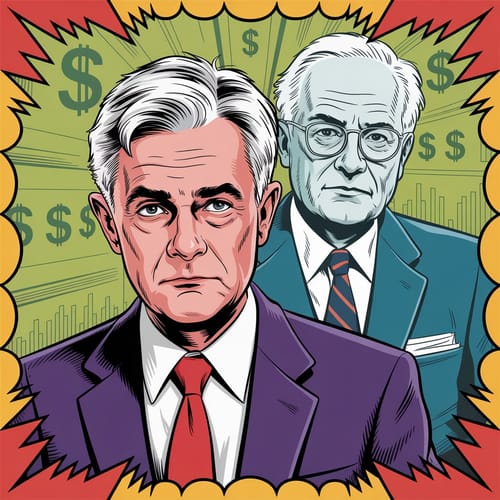Jerome Powell's Jackson Hole performance this week was a masterclass in central banking theater. Markets cheered his (supposed) dovish pivot, traders bumped up rate cut odds to 85%, and analysts tore up their forecasts. But strip away the carefully choreographed messaging and a more uncomfortable question emerges: Why has Powell been so resistant to cut rates when the economic data has been screaming for relief?
The answer isn't found in employment statistics or inflation readings. It's found in the psychology of a man desperately trying to secure his place in monetary history.
The Volcker Obsession
Every Fed Chair lives in Paul Volcker's shadow, but Powell might be uniquely captivated by the legend. Volcker's story is simple and brutal: he broke inflation's back in the early 1980s by jacking rates to 20%, triggering the worst recession since the Great Depression, and emerged as central banking's greatest hero. His legacy as the ultimate inflation destroyer remains the gold standard for Fed credibility.
If Powell sees Volcker as his hero, then his policy stances make more sense. Having already stumbled with "transitory" inflation, perhaps Powell believes his only path to Volcker-like historical standing is through unwavering vigilance against any inflation resurgence—even potential ones.
Powell appears to want that legacy. He seems determined to be remembered as the Fed Chair who tamed inflation, not the one who let it run wild. This aspiration made perfect sense when inflation was running at 9% and the Fed needed credibility. But now, with inflation moderating and unemployment creeping higher, what might be Powell's Volcker obsession could be becoming a dangerous trap.
The Political Theater Problem
Trump's relentless attacks might have created an impossible bind, but they don't require complete capitulation. Powell doesn't need to hold his ground until May—he could gradually walk policy back just enough to partially appease Trump while maintaining his inflation-fighting credentials. Every demand for rate cuts, every "too late" jab, every threat to fire Fed officials creates pressure that could be managed through strategic dovishness rather than outright defiance.
But there is likely a personal element at play too. Powell, likely a Democrat given his professional background and previous roles, could be influenced by political considerations that go beyond institutional independence. If Powell genuinely dislikes Trump—and given the years of public attacks, who could blame him—then the pressure campaign might actually be counterproductive, stiffening his resolve to avoid appearing weak or politically captured.
The Data vs. The Narrative
Let's be clear about what the numbers actually show. Unemployment has ticked up to 4.2%. Payroll gains have plummeted to an average of 35,000 per month from July to May. The labor market Powell described as being in "curious balance" is wobbling dangerously close to breakdown.
Meanwhile, inflation has been moderating steadily. Core PCE is trending toward the Fed's 2% target. Even Powell's concerns about tariff-driven inflation acknowledge this impact would likely be "short-lived."
So why the hesitation? Consider the contradictory pattern:
Powell was slow to raise rates when inflation was actually materializing, famously calling it "transitory." Yet now he's cautious to cut rates based on potential future inflation from tariffs.
This contradictory stance (read: hypocrisy) reveals something beyond pure data-driven policy making.
The Legacy Trap
Perhaps Powell has fallen into the classic trap of fighting the last war. Cutting rates now would require Powell to admit his previous approach was flawed on multiple fronts. Having already been wrong about "transitory" inflation, being seen as cutting rates "too early" and risking an inflation resurgence could be catastrophic for someone trying to build a Volcker-like reputation as an inflation destroyer.
Volcker's situation was fundamentally different—inflation expectations were skyrocketing, Fed credibility was shot, and shock therapy was genuinely necessary. Today's economy faces different challenges that require different tactics. But admitting this would mean abandoning the Volcker playbook that has guided Powell's entire approach to inflation.
Here's what makes Powell's position even more precarious: markets are already pricing in his failure. The steep curve in rate cut expectations suggests traders believe Powell has been behind the curve and will be forced into aggressive easing soon.
When markets start front-running your policy reversals, you've already lost the credibility game. Powell's careful Jackson Hole messaging—simultaneously dovish and hawkish—once settled has really satisfied no one.
Don't let the market's one day reaction to news fool you. Powell used plenty of non-committal caveats in his wordings, like when a parent tells their child "We'll see." when the child asks for a new toy.
The Real Calculation
Strip away the economic analysis and legacy concerns, and Powell's calculation might become clearer:
Survive until May without a catastrophic policy error.
He doesn't need to completely defy Trump—just gradually shift dovish enough to reduce political heat while preserving his credentials as an inflation destroyer. This could explain his Jackson Hole pivot: not capitulation, but strategic positioning.
The Cruel Irony
The ultimate tragedy is that Powell's obsession with emulating Volcker is preventing him from learning Volcker's most important lesson. Volcker wasn't great because he was consistently hawkish—he was great because he was pragmatically ruthless about doing what the moment required.
When inflation demanded crushing, Volcker crushed it. When the economy needed relief, he provided it. He understood that central banking isn't about ideological purity—it's about reading conditions correctly and acting decisively.
Powell's Jackson Hole pivot suggests he may finally be learning this lesson. But his resistance to cutting rates earlier, despite clear economic signals, reveals a central banker more concerned with historical perception than present reality.
In trying so desperately to be Volcker, Powell may have forgotten the most basic truth of central banking: sometimes the most courageous thing you can do is admit you were wrong and change course. The economy doesn't care about your legacy—it only cares about whether you're making the right decisions for the moment you're actually in.

